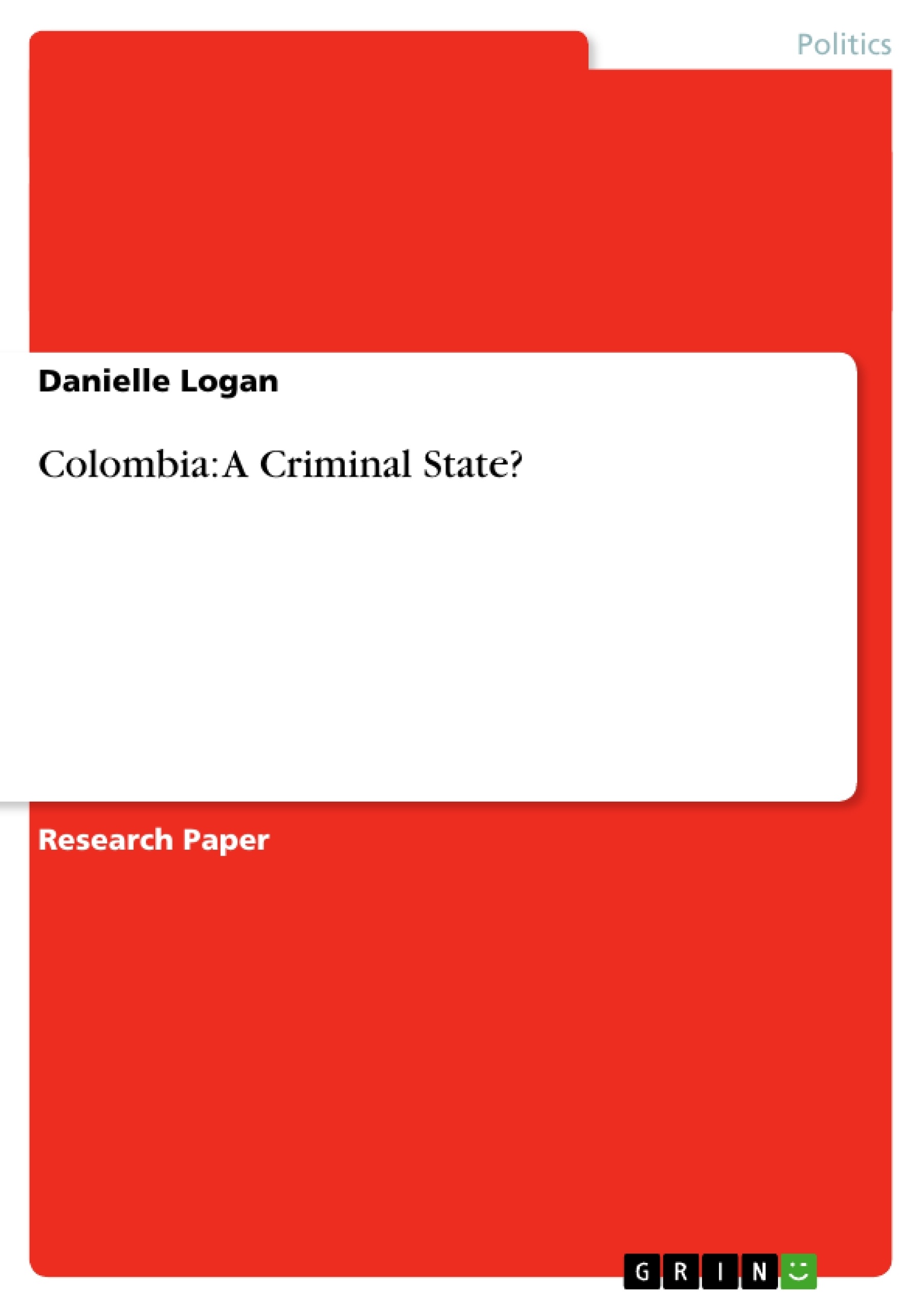Excerpt
Introduction
Colombia is considered the fourth largest country in South America with an area of 1.14 million square kilometres. It has a population of approximately 46.04 million (2011) and its official language is Spanish. Colombia’s ethnic groups include mestizo (58%), white (20%), mulatto (14%) and Afro-Colombian and indigenous (10%). It is estimated, according to the United States Department of State, that over 45 % of the population live below the poverty line. In addition, there exist large income disparities and inadequate social services as the distribution of wealth and income is significantly uneven.
A Republican type government exists with branches in the executive, legislative and judicial. Colombia’s economy is dominated by the service industry which accounts for 46 % of its Gross Domestic Product. This is followed by the manufacturing, mining and agriculture which generates 14.4 %, 7.8 % and 7.1 % respectively.
Colombia is metaphorically a battlefield for decades of violent conflicts between armed groups, drug cartels and human rights violations. It is at this point that it is necessary to note that in relation to other nations around the globe, Colombia is today considered a criminal state. The focus of this research paper will now highlight what exactly is a criminal state, why Colombia is considered a criminal state and lastly some recommendations will be made with respect to how Colombia can become a non-criminal state.
What is a Criminal State?
While there is not a sound definition available for a criminal state, based on research, the author has found that a criminal state is one in which there are extremely high levels of organized crime that are perpetuated by high levels of corruption. At this point, it is necessary that in order to understand what a criminal state is, it is important to provide definitions for both organized crime and corruption.
According to the United Nations organized crime is defined as
“one of the major threats to human security, impeding the social, economic, political and cultural development of societies worldwide. It is a multi-faceted phenomenon and has manifested itself in different activities, among others, drug trafficking, trafficking in human beings; trafficking in firearms; smuggling of migrants; money laundering; etc. In particular drug trafficking is one of the main activities of organized crime groups, generating enormous profits.”
On the other hand, corruption is defined by the United Nations as follows:
“a complex social, political and economic phenomenon that affects all countries. Corruption undermines democratic institutions, slows economic development and contributes to governmental instability. Corruption attacks the foundation of democratic institutions by distorting electoral processes, perverting the rule of law and creating bureaucratic quagmires whose only reason for existing is the soliciting of bribes. Economic development is stunted because foreign direct investment is discouraged and small businesses within the country often find it impossible to overcome the "start-up costs" required because of corruption.”
In light of the above two definitions, a criminal state constitutes black market activities coupled with instrumental violence (which is a significant feature of organized crime) and corruption which allows this organized crime to flourish. It is through corruption that criminals can gain favour with public officials, be an influencing power of politics as well as infiltrate state organizations and legitimate businesses.
Chene (2008) of the Anti-Corruption Resource Centre postulated that there is a symbiotic relationship between the state and criminal organizations since these organizations need legitimate state structures to sustain and expand its operations. Subsequently, Chene (2008), based on previous research by the Transparency International, argued that in most countries, corruption of public officials including law enforcement and judicial officers is a very common feature of organized crime. It is in these circumstances that criminal organizations are in a better position to secure survival and thus minimize the risk of being arrested and prosecuted. In addition, it is not uncommon to find links between customs and border officials and illicit trafficking kingpins around the globe. For instance in South Eastern Europe, in particular Yugoslav, it was found that the development and organization of smuggling channels was facilitated by collaboration between high level politicians, security forces and organized crime perpetrators.
Systematic Linkages between Organized Crime and Corruption
In a criminal state, persons within the organized criminal units tend to infiltrate the public sector not only through acts of bribery but by also becoming employed within government agencies themselves as either mid level or high ranking officials. They also seek to enter into the political arena which makes it even easier to influence political decisions.
Secondly, corruption is the driving force of organized crime. Since it has been established that almost fifty per cent (50%) of the population live below the poverty line in Colombia and there exists high income disparities and only a few legitimate opportunities exist within this state, it is reasonable to say that with this high incidence of poverty organized crime is seen as favourable (and sometimes the only option) to the poor. In addition, the opportunities are further decreased when corruption is placed into the equation since corruption sorely hinders economic growth and development for any nation state.
Thirdly, corruption provides leeway for the presence of illicit activities. In developing countries with weak governance and state institutions such as that which exists in Colombia, corruption tends to flourish. This is so because the law does not make adequate provisions for corrupted elements in terms of investigations and prosecutions. Therefore it is very easy for corruption to exist with a guaranteed little or no punishment.
In essence, a criminal state is one where organized crime is facilitated by high levels of corruption not only in the public sector but also the private sector. It is thus a state where true democracy is nothing but an illusion to those who live in it and violation of human and civilian rights has become the norm.
[...]
- Quote paper
- Danielle Logan (Author), 2011, Colombia: A Criminal State?, Munich, GRIN Verlag, https://www.grin.com/document/207847
Publish now - it's free






















Comments